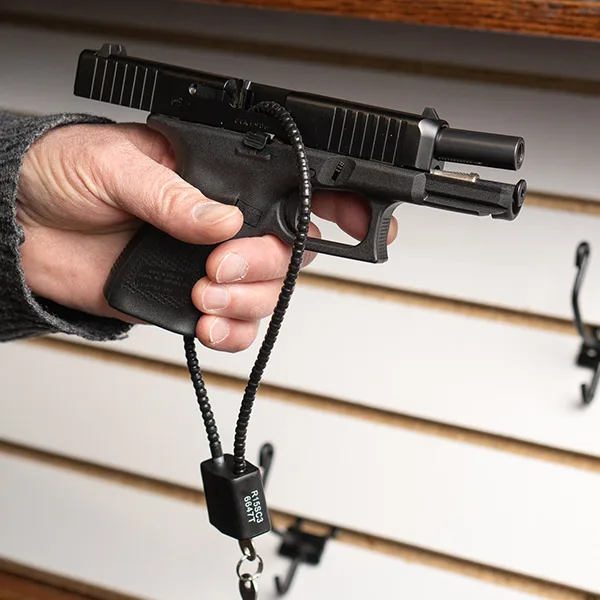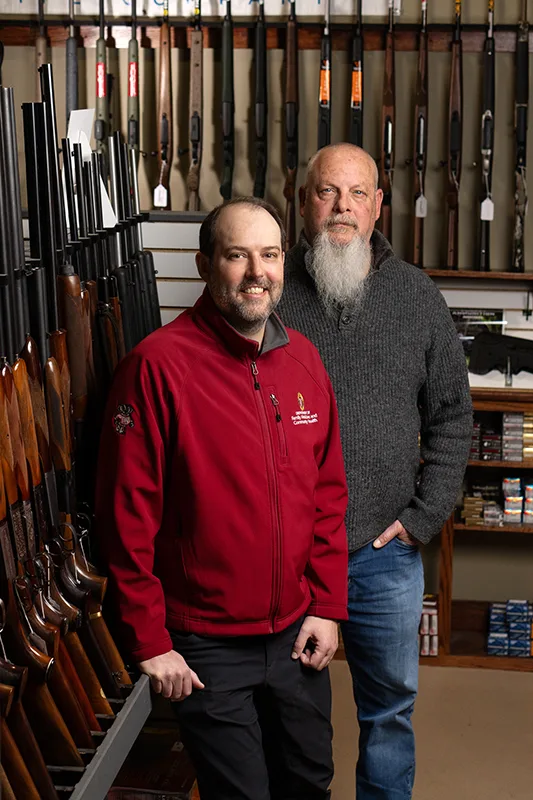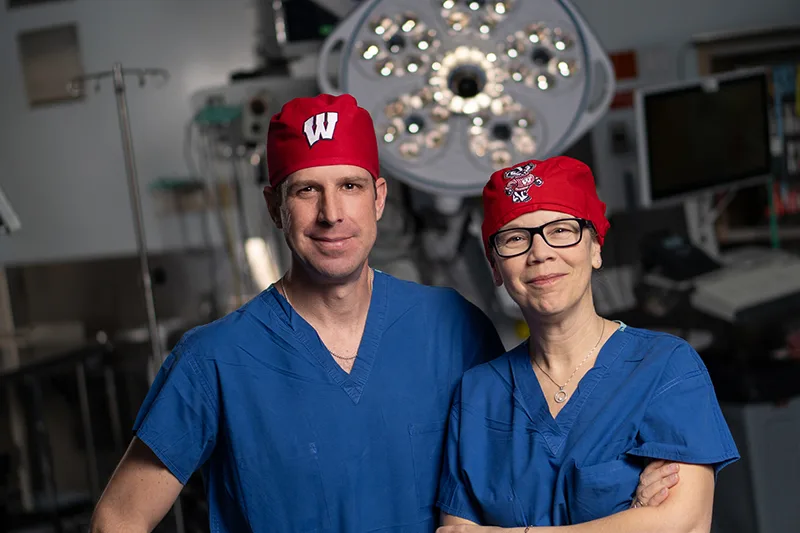TRIUMPH Program Supports the Latina Community
In the words of Coretta Scott King: “The greatness of a community is most accurately measured by the compassionate actions of its members.”
Whether you are an experienced physician, a resident venturing into practice or a medical student, you likely spend much of your time in a hospital or clinic setting.
A small but growing number of health care providers affiliated with the University of Wisconsin School of Medicine and Public Health (SMPH) and UW Health spend a few hours of their medical education at a more unconventional venue — a gun shop.

Spearheaded by James Bigham, MD ’08, MPH ’12 (PG ’12), a clinical professor in the Department of Family Medicine and Community Health (DFMCH), firearm-safety training offers learners the chance to become familiar with firearms, with the goal of building cultural competency around discussing firearms. In turn, Bigham says, health care providers can speak more confidently with their patients about firearm-related responsibilities and ways to prevent injuries that can be caused by firearms. A little nudge from the doctor, physician assistant, or nurse may be enough to encourage someone to ensure their firearms are safely stored and inaccessible to at-risk individuals or children. That, notes Bigham, means fewer people needlessly dying or suffering disabling injuries from a gunshot wound.
Bigham formally advocated for patient firearm screening in a June 2022 essay — published in the Wisconsin Medical Journal (WMJ) — that he co-authored with Melissa Stiles, MD (PG ’91), professor emeritus, DFMCH, SMPH; Stephen Hargarten, MD, MPH, professor, Department of Emergency Medicine, Medical College of Wisconsin; Mary Lauby, adult trauma injury prevention coordinator, UW Health; and Nan Peterson, retired director of child health advocacy, UW Health. (See the WMJ essay on preventing firearm-related death and injury (PDF))
“To save the lives of hundreds of Wisconsinites per year,” the authors wrote, “Wisconsin’s health care systems should encourage primary care providers and other physicians and clinicians to perform brief screening for firearm ownership, followed by counseling on firearm-injury prevention. This intervention is crucial for patients at risk for self-harm and intimate partner violence and patients with mental illness (including dementia and depression), as well as homes with children or adolescents.”
Bigham — who earned his medical and master of public health degrees from SMPH, completed a family medicine residency at DFMCH and practices at the UW Health Odana Road Clinic in Madison — says statistics are sobering.
“More than 800 people die from gunshot wounds each year in Wisconsin, and the majority of those deaths are suicides. Firearms are the top cause of death for children in the United States, more than motor vehicle fatalities, drownings, and childhood cancers,” he states.
With guns present in nearly half of Wisconsin homes, Bigham says, the time is long overdue for health care providers to address firearm safety while conversing with their patients.
“We already talk about responsible use of car seats, bicycle helmets, and life jackets,” he shares. “We should do the same when it comes to firearm safety.”

Essential to Bigham’s attitude when bringing up a topic that he characterizes as “politicized” is his ability to stay focused on injury prevention. No judgment; no politics.
“Guns are among the most highly charged issues in the political arena, but we’ll leave gun rights to the politicians,” Bigham says. “I am not here to glorify or vilify gun owners or their firearms. My goal is simply to reduce the number of people who are killed or injured, often inadvertently.”
Aided by an introduction by Jean Papalia, a community partner working at Safe Communities Madison–Dane County, Bigham connected with Steve D’Orazio, owner of Max Creek Outdoors gun shop in Oregon, Wisconsin, just south of Madison.
Bigham asked D’Orazio, “How would you feel if you and I started a gun safety talk at your shop and invited faculty, residents, staff, and students affiliated with the UW School of Medicine and Public Health and UW Health?”
D’Orazio agreed, and by early 2023, the class was running. Each month, about a dozen learners attend a two-hour training session held in a private room in D’Orazio’s shop. Bigham begins by declaring the room a “safe space” where questions or comments are welcome, and judgment is suspended.
Participants get a hands-on, up-close look at semiautomatic handguns, rifles, and types of ammunition. They see how safety devices — such as cable locks, trigger locks, and gun safes — can prevent a firearm from discharging. And they learn that some gun shops offer safe storage of firearms for individuals experiencing mental health crises.
D’Orazio ends the session by cutting to the chase.
“Guns don’t have brains,” he says. “That’s why we need your help.”
Following the classroom-style presentation, participants are offered an optional, hands-on opportunity to fire a gun at Max Creek’s indoor shooting range. For some, it’s the first time they have fired or even touched a firearm. For most, it is the first time they recognize that a gun shop can serve as a partner in firearm-injury prevention.
“We hope this gives health care providers a better sense of what it means to fire a weapon, so their patients are more receptive to keeping these things locked up,” D’Orazio states.
Mario Giacobassi, MD ’23, an SMPH alumnus and first-year family medicine resident in the DFMCH who attended the training in 2023, applauds Bigham and D’Orazio for offering an out-of-the-box learning opportunity.
“What really appeals to me is that these are steps we can take with our patients right now,” Giacobassi says. “We don’t have to wait for laws or regulations to be changed. Having the chance to see, touch, and shoot a gun also makes me feel like I know what I’m talking about with my patients.”
Another first-year family medicine resident, Julie Vaughan, MD, appreciates how Bigham’s non-judgmental approach lightens the tension surrounding what could be a highly controversial subject.
“I grew up around guns in rural Indiana,” Vaughan recalls. “While I did not become a hunter myself, guns were just part of the landscape. Today, we know how prevalent untreated mental health conditions are in rural areas, so the training is timely for people like me who plan to practice in rural communities.”
Surprisingly, Bigham says, fewer than five patients have shown even the slightest objection to being asked about the presence of guns at home.
“Most people get it, especially when we put it in the larger context of keeping people safe,” he observes. “For the sake of optimizing wellness, we talk about tobacco and drug use; we talk about not drinking and driving; we talk about safer sexual activity. Safe gun storage should be part of this conversation.”
For those patients who say ‘yes’ when asked if they have guns at home, Bigham asks whether the firearms are safely stored — ideally unloaded and locked.
If they say ‘no’ to the second question, Bigham and his colleagues offer cable or trigger locks that patients can take home on the spot, for free. The locks are provided through UW Health’s Injury Prevention Program, which is managed by Mary Lauby and Rishelle Eithun. More than 300 free gun locks were distributed to UW Health clinics and community partners in 2023. In addition, when a firearm-owning patient experiences a mental health crisis, they are encouraged to voluntarily transfer their firearms to a loved one who can safely store them or to a gun shop that will hold them in a safe until the owner feels well enough to have them back.
Few can speak more authoritatively about the consequences of gun violence than a surgeon who operates on gunshot victims. Adam Brinkman, MD (PG ’15), associate professor, Department of Surgery, and trauma medical director, UW Health Kids, says the pediatric surgery team he leads has — since 2016 — operated on more than 40 children, including a 9-month-old infant, who have been injured or killed by a gunshot.
“I have cried with more families than I care to admit while telling them that their child has passed away or sustained a serious injury,” Brinkman shares. “I wholeheartedly support what our colleagues are doing to encourage safe firearm storage.”
A father of two young children, Brinkman advises parents to ask about guns at home before allowing their child to visit a friend’s house for the first time, because unintentional firearm incidents often occur at a family residence.
“Kids are curious by nature, and they always should be curious,” Brinkman says. “It’s how they learn. Unfortunately, it doesn’t take long for a curious child to stumble upon an unlocked gun and pull the trigger. Telling a child not to touch a gun if they see one simply doesn’t work.”
Ann O’Rourke, MD ’02, MPH ’06 (PG ’09), associate professor, Department of Surgery, and medical director for adult trauma, UW Health, says that saving the life of a gunshot victim in the operating room is rewarding, but too many survivors still face a life filled with multiple surgeries, lengthy hospital stays, and permanent disabilities. Throw in the endless emotional and financial tolls incurred by these patients, and seldom does O’Rourke witness an entirely happy ending.

“The best patient,” she says, “is the one we never see.”
As for Bigham, he is grateful for the support he has received in his quest to make conversations about safe storage of firearms more universal between health care providers and patients.
“This is just the start of a marathon,” Bigham states. “Our goal is to incorporate firearm-injury-prevention training into the UW School of Medicine and Public Health’s curriculum and save lives. It is the embodiment of the Wisconsin Idea that what we do at UW–Madison can directly enhance the lives of people for whom we provide care across the state.”
When a victim of gun violence is rushed to the UW Health Emergency Department, saving the patient’s life is paramount. Helping them come to terms with the ensuing emotional trauma while finding a way back to a better place in society are typically not resource capabilities offered by a health system.
A Madison, Wisconsin-based non-profit organization, Focused Interruption, helps fill this void by defusing traumatic situations in the minutes and hours following a shooting victim’s arrival at the hospital. With tensions high, these situations can be ripe for escalation and further violence.
“After a violent crime involving a shooting or stabbing, we dive in to help the family of the victim. The hospital contacts us, and we send one or more outreach specialists there to support the family. Our goal is to interrupt a cycle of violence that we know can happen after someone is shot or stabbed,” says Anthony “Coop” Cooper, the CEO and president of Focused Interruption.
Because Cooper and his team are active members of the community — several have experienced gun violence themselves — family members of shooting victims typically feel a sense of trust when they start the conversation.
“Families appreciate having someone show up who comes from a similar place of understanding,” Cooper says. “It’s not unusual for the victim’s relative or friend to talk about retaliating. That’s when we say, ‘Let’s go for a walk.’ We have better conversations when things calm down, and that can prevent things from getting deeper.”
Founded by Cooper about 15 years after he served prison time for drug-related offenses, Focused Interruption is financially supported by more than a dozen community partners. As one of the original sponsors, UW Health relies on the indispensable service the organization provides to patients, family members, and the community.
“Their work does not stop after the victim leaves the hospital,” says Shiva Bidar-Sielaff, SMPH associate dean for diversity and equity transformation and UW Health vice president for diversity, equity, and inclusion. “Coop has helped these patients find a job, get into apprenticeship programs, and get out of a cycle of violence. It shows the value of a partnership between a community-based organization and a health system. This is health equity in action.”
Chris Corrigan, director, UW Health Security Services Department, adds, “Having Focused Interruption on site when a shooting victim arrives supports the family, as well as our clinical staff, who can focus on providing the patient with the best possible care.”
Cooper has gone from a self-described “young knucklehead” to a proud father of two grown sons and recipient of the 2019 Madison-Dane County Humanitarian Award for his community work. He also applied for and in 2021 received a pardon from Governor Tony Evers for his 1999 drug crimes. Further, Evers appointed Cooper to the Governor’s Pardon Advisory Board in 2022.
“Coop is one of the most important, most loved community members and role models in Madison,” says Bidar-Sielaff.